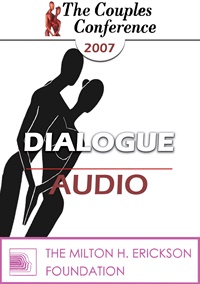
- Average Rating:
- Not yet rated
- Topic Areas:
- Dialogues | Attachment | Couples Therapy | Differentiation
- Categories:
- Couples Conference | Couples Conference 2007
- Faculty:
- Ellyn Bader, PhD | Stan Tatkin, PsyD, MFT
- Duration:
- 1:03:29
- Format:
- Audio Only
- Original Program Date:
- Apr 28, 2007
- Short Description:
- CC07 Dialogue 01 - Integrating Attachment and Differentiation-Based Interventions in Couples Therapy - Ellyn Bader, PhD, and Stan Tatkin, PsyD
- Price:
- $15.00 - Base Price
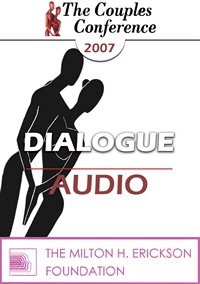
- Average Rating:
- Not yet rated
- Topic Areas:
- Dialogues | Couples Therapy | Sex and Sexuality
- Categories:
- Couples Conference | Couples Conference 2007
- Faculty:
- Pat Love, EdD | Jeffrey Zeig, PhD
- Duration:
- 59:33
- Format:
- Audio Only
- Original Program Date:
- Apr 28, 2007
- Short Description:
- CC07 Dialogue 02 - Integrating Sex Therapy into Couples Counseling - Pat Love, EdD, and Jeffrey Zeig, PhD
- Price:
- $15.00 - Base Price
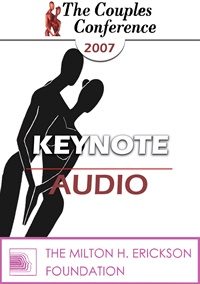
- Average Rating:
- Not yet rated
- Topic Areas:
- Keynotes | Couples Therapy | Marriage | Relational Life Therapy Model (RLT) | Relationships
- Categories:
- Couples Conference | Couples Conference 2007
- Faculty:
- Terry Real, LICSW
- Duration:
- 1:16:02
- Format:
- Audio Only
- Original Program Date:
- Apr 27, 2007
- Short Description:
- The traditional marriage of our parents, grandparents and before was the companionable marriage. This lecture introduces a new 21st Century skill-set, relationship empowerment, which enables women to stand up for increased closeness in their relationships, while helping men understand new demands and how to meet them successfully.
- Price:
- $15.00 - Base Price
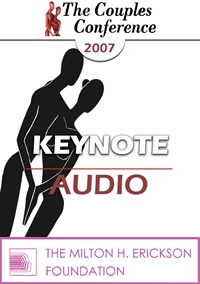
- Average Rating:
- Not yet rated
- Topic Areas:
- Keynotes | Abuse | Couples Therapy | Multicultural | Community | Gender
- Categories:
- Couples Conference | Couples Conference 2007
- Faculty:
- Cloe Madanes, HDL, LIC
- Duration:
- 59:31
- Format:
- Audio Only
- Original Program Date:
- Apr 27, 2007
- Short Description:
- This presentation will cover the assessment and detection of spousal and partner abuse, as well as intervention strategies. Community resources, cultural factors and same gender abuse dynamics also will be discussed.
- Price:
- $15.00 - Base Price
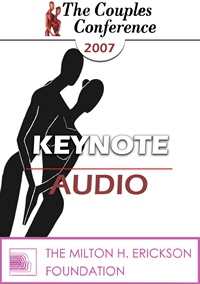
- Average Rating:
- Not yet rated
- Topic Areas:
- Keynotes | Couples Therapy | Marriage
- Categories:
- Couples Conference | Couples Conference 2007
- Faculty:
- Harville Hendrix, PhD
- Duration:
- 57:32
- Format:
- Audio Only
- Original Program Date:
- Apr 28, 2007
- Short Description:
- This lecture will posit that marriage is alive and well and evolving into a new form, replacing a personal, psychological marriage focused on the satisfaction of individual need with a partnership marriage that produces healing and evokes psychological and spiritual growth. This transition is an instance of a shift from the "individual paradigm "to the "relational paradigm."
- Price:
- $15.00 - Base Price
Tags: Couples Therapy Marriage
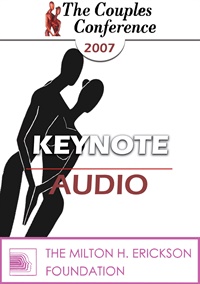
- Average Rating:
- Not yet rated
- Topic Areas:
- Keynotes | Couples Therapy | Mindfulness | Neurobiology | Relationships
- Categories:
- Couples Conference | Couples Conference 2007
- Faculty:
- Daniel Siegel, MD
- Duration:
- 57:41
- Format:
- Audio Only
- Original Program Date:
- Apr 28, 2007
- Short Description:
- This keynote address will offer an overview of the neural basis of mindful awareness and how this important way of being present and receptive to one's own inner processes creates enhanced capacity for emotional resonance and empathy.
- Price:
- $15.00 - Base Price
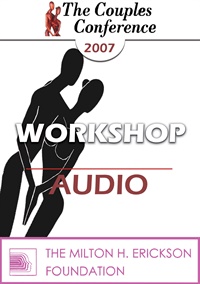
- Average Rating:
- Not yet rated
- Topic Areas:
- Workshops | Couples Therapy | Relational Life Therapy Model (RLT) | Relationships
- Categories:
- Couples Conference 2007 | Couples Conference
- Faculty:
- Terry Real, LICSW
- Duration:
- 2:33:29
- Format:
- Audio Only
- Original Program Date:
- Apr 27, 2007
- Short Description:
- Learn the three key elements of Relationship Empowerment Therapy: The use of leverage; Attention to "clean-up" issues; The relationship grid. Participants will be introduced to techniques to help partners learn: Where they are stuck in their relationship; What "unfinished business" fuels their "stuckness;" The consequences of not changing, as well as the opportunities for change; How to get from where they are to where they need to be.
- Price:
- $15.00 - Base Price
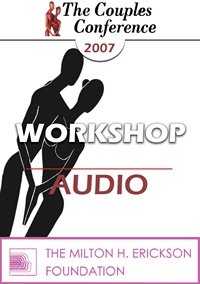
- Average Rating:
- Not yet rated
- Topic Areas:
- Workshops | Couples Therapy | Communication | Relationships
- Categories:
- Couples Conference | Couples Conference 2007
- Faculty:
- Pat Love, EdD
- Duration:
- 2:27:25
- Format:
- Audio Only
- Original Program Date:
- Apr 27, 2007
- Short Description:
- Talking makes many matters worse, not better. Talking can not only exacerbate problems and differences, but prevent the deepest moments of intimacy. Oftentimes therapy focuses too much time talking about connection rather than connecting. Come learn strategies to help couples create love beyond words.
- Price:
- $15.00 - Base Price
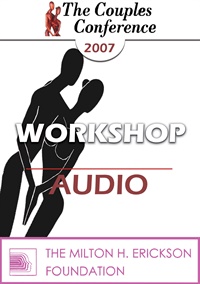
- Average Rating:
- Not yet rated
- Topic Areas:
- Workshops | Confrontation | Couples Therapy
- Categories:
- Couples Conference | Couples Conference 2007
- Faculty:
- Ellyn Bader, PhD
- Duration:
- 1:48:02
- Format:
- Audio Only
- Original Program Date:
- Apr 27, 2007
- Short Description:
- While confrontation is often the best way to help clients examine their contribution to a problem, many therapists feels anxious about the tension aroused during confrontation. Leam to employ confrontation in couples work with special emphasis on matching the intensity of the confrontation- gentle to tough- with the level of impasse. The focus will be on how to select what to confront, when to confront, and how to build a confrontation over time. You will leave this session with a firmer grasp of the attitude and posture necessary to use confrontation more effectively in your work.
- Price:
- $15.00 - Base Price
Tags: Confrontation Couples Therapy
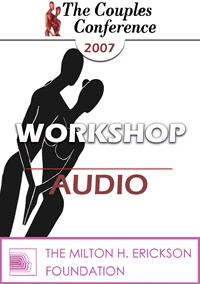
- Average Rating:
- Not yet rated
- Topic Areas:
- Workshops | Couples Therapy | Relationships
- Categories:
- Couples Conference | Couples Conference 2007
- Faculty:
- Cloe Madanes, HDL, LIC
- Duration:
- 2:57:57
- Format:
- Audio Only
- Original Program Date:
- Apr 27, 2007
- Short Description:
- Madanes will present a series of skills, practices and strategies for enhancing relationships. There will be an opportunity for discussion and for practicing some of these skills.
- Price:
- $15.00 - Base Price
Tags: Couples Therapy Relationships
Please wait ...

